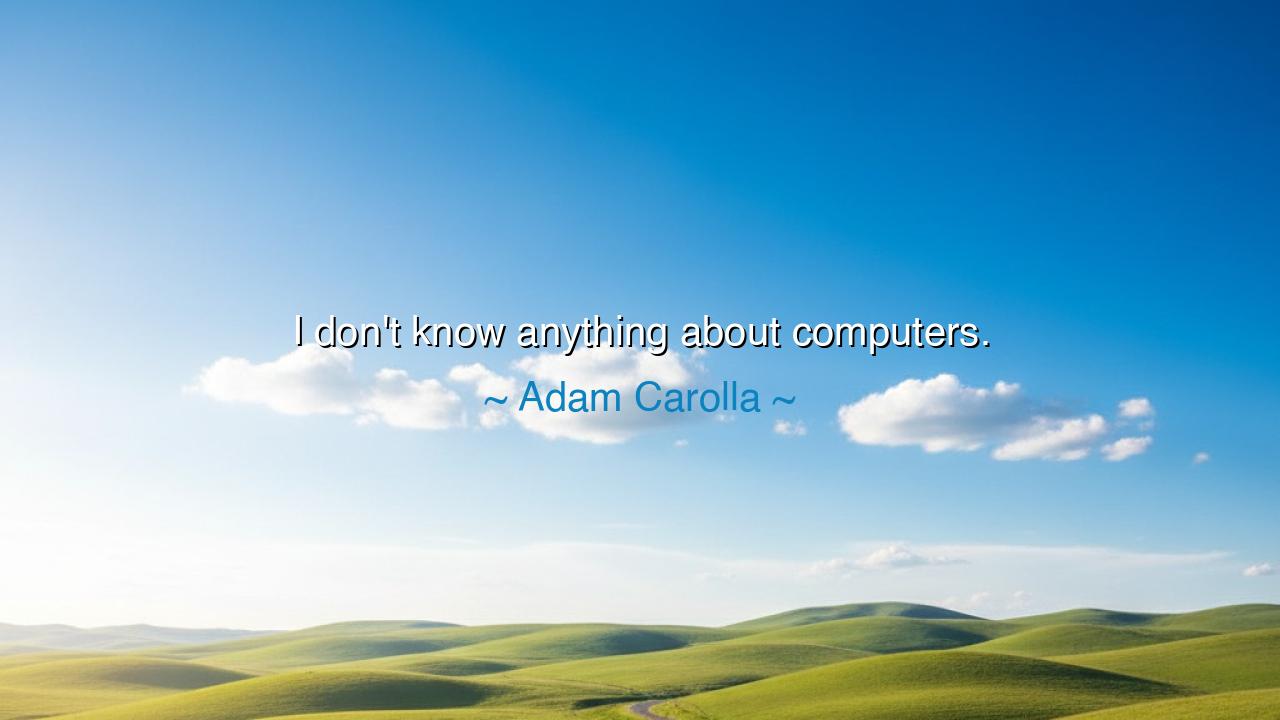
I don't know anything about computers.






In a world constantly moving forward, where technology reigns as the key to modern existence, there is a profound wisdom found in the simple admission of Adam Carolla: “I don’t know anything about computers.” This statement, though humble and seemingly unremarkable, speaks to the timeless truth that not all knowledge is to be sought in the realms of the machine or the digital world. It is a declaration of human humility, an acknowledgment that there are forces larger than ourselves—forces of change, forces of knowledge—that we must accept and, in some ways, embrace without fully understanding their intricacies.
In the ancient world, wisdom was often defined not by the breadth of knowledge one could amass, but by the clarity of one’s mind. The great philosophers of antiquity—Socrates, Plato, and Aristotle—sought to understand the nature of being and the world around them, but they also knew that some truths were not meant to be fully understood. Socrates famously said, “I know that I am intelligent, because I know that I know nothing.” This wisdom mirrors Carolla’s sentiment. To confess ignorance in the face of something complex is not a mark of weakness, but rather a sign of wisdom. It is the acceptance that some aspects of life are too vast, too intricate, or too far beyond our grasp to fully comprehend.
Consider, for example, the ancient mariners, who sailed across unknown seas, not with the advanced tools we have today, but with the guidance of the stars and the ebb and flow of the tides. They did not fully understand the vastness of the oceans, nor the forces at play beneath the waves, but they trusted the instincts that had been honed over time. Similarly, Carolla’s statement reflects the wisdom of trusting in the world around us, even when we do not understand every aspect of it. The mariners did not need to know all the mechanics of the sea to navigate it—they simply needed to know how to sail.
The admission of not knowing, however, should not be confused with resignation. Just as Socrates continued to question and explore, even in the face of his own admission of ignorance, Carolla’s statement is an invitation to freedom. It is a call to liberate oneself from the pressure of feeling that one must understand everything, that one must be adept at all things, especially in a world that is increasingly dominated by technology. The truth, as Carolla so succinctly states, is that there is power in acknowledging limits—in saying, “I do not know.” This humble acceptance can open the door to a wider world of possibilities and clarity.
In the great empires of the past, knowledge was not always accessible to all, and it was often confined to the elite. In ancient Egypt, only the scribes and priests held the secrets of writing and mathematics, guarding their knowledge with a certain mysticism. Yet, it was through the questioning of this elite knowledge that new understanding emerged. The very act of not knowing, of questioning the accepted norms, led to advances in science, in art, and in philosophy. Carolla’s words echo this universal truth: ignorance is not to be feared, but rather embraced as a place from which growth can spring.
The lesson that Carolla imparts is timeless. In the age of digital dominance, we are constantly bombarded with the need to understand everything from computers to artificial intelligence. But true wisdom lies in knowing when to release the desire for complete mastery over the things that do not serve us directly. Instead, we must focus on cultivating the qualities that truly matter—empathy, human connection, and the pursuit of knowledge that enhances our lives. The world will continue to evolve, and new challenges will arise, but if we accept that there will always be mysteries beyond our comprehension, we can find peace in the chaos.
Therefore, the practical lesson is this: Do not be afraid to admit ignorance. Embrace it as a space where you can grow, ask questions, and evolve. The world does not require that you know everything, and in truth, it is the unanswered questions that spark the greatest discoveries. Just as Socrates found wisdom in his awareness of ignorance, and just as the mariners found their way by trusting in their instincts, so too can we navigate the complex world of technology and life itself with the simple yet powerful realization that we do not have to understand it all. It is enough to participate, to engage, and to seek knowledge where it truly matters.






AAdministratorAdministrator
Welcome, honored guests. Please leave a comment, we will respond soon